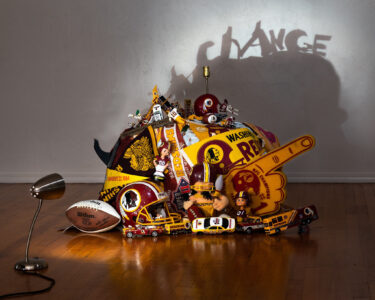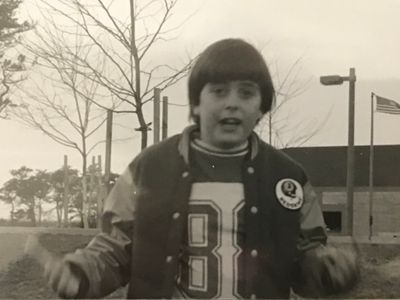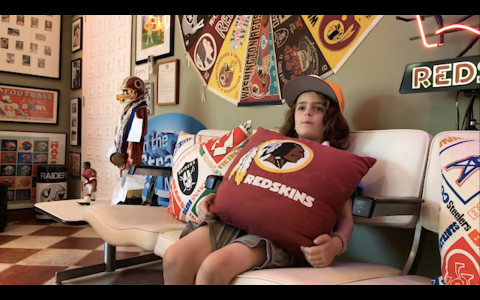Native-Inspired Sports Team Names: Reckoning and Change
Banner photo by Anders Krøgh Jørgensen on Unsplash
Donick Cary wrote for David Letterman and helped to produce the Emmy Award–winning The Simpsons and Parks and Recreation. So how did a funny guy like him end up tackling the sensitive subjects of racism and Native American representation in a documentary film?

Cary (’88) was born in Washington, D.C., and grew up watching Washington Redskins football games with his dad. When he and his wife bought their home, he converted the shed into his game room. He installed three televisions and covered the walls with memorabilia bearing the team’s name and Native American–inspired logo. Then, during a game four years ago, his eight-year-old son, Otis, asked, “Dad, isn’t that racist?”
A difficult conversation followed—and then Cary and his son decided to educate themselves. They set out to interview people across the country about what it means to be a Native American today and how the team’s name had affected them. Cary and his son eventually turned the camera on themselves, and the project sparked a personal reckoning: Cary stripped his game room of memorabilia—sending most of it to artist Steven Paul Judd for a special installation—and began to reevaluate some of his comedy writing, including lines for the character Apu on The Simpsons. He hopes to premiere the film, Hail to the Breadsticks!—whose title is a reference to a Parks and Recreation joke (more on that below) and a play on the team’s former fight song—at a festival in 2022.
Tyler Davis (’20, COM’22) has assisted Cary on the documentary, working remotely from Boston to help screen footage, organize and edit notes, and work with the film’s editors and producers. “It’s been great to have the next generation of BU filmmakers help us organize and plot our way to a finished film,” Cary says.
Since Cary and his son began their film, Washington has dropped its name—becoming, for the last two seasons, the generic Washington Football Team before announcing a permanent name in February 2022: the Washington Commanders; Major League Baseball’s Cleveland Indians are following suit and will debut as the Guardians in 2022. But hundreds of professional, collegiate, and high school teams continue to use Native-inspired names. While the Atlanta Braves were playing their way to a World Series championship—with their fans tomahawk chopping in the stands—Cary spoke with Collegian about learning from the people most hurt by those depictions.
Collegian: How did you become a fan of the Washington Commanders—and what does fandom mean to you?

Donick Cary: I was born in Washington, D.C., in 1968. My dad had grown up there and my grandfather. The team had always been a part of their lives. My parents were divorced, so I’d get together with my dad and watch the game. This might sound like giving it too much weight, but football was like a religion to us. The games are on Sunday, you sit down, you hang out, you bond. It was a real family connection.
When did you start to question the team’s name?
I’m now handing this love and this bond down to my son, Otis, and we were watching a game and he said, “Dad, isn’t that racist?” And I started to say all the things that I had been programmed to say, all these PR things. It’s very hard to question things that you love.

The first thing we did [for the film] was talk to a panel of Athabaskan people in Alaska. I was like, “I bet they don’t even care or know about a football team in Washington.” And we sat down, and one of them said, “This is America, you can say what you want. I’m Indigenous and, matter of fact, I love that team.” And then the other people on the panel just laid into him. Each one had a different example of how it actually affected them. One of their kids went to a school with a native mascot and had to go to games where people were dressing up. They felt invisible to their communities.
I don’t use the R-word anymore. For many of the people we’ve talked to, it’s a lot like the N-word.
How did the two of you report this story?
We got these nice little lens attachments that you can screw on an iPhone, and I got an audio kit. Alaska was the first experiment. It led to 100 adventures, which is part of what life is all about. I definitely took Otis out of school a few times. I hope he is better for it. I think he will be. I am, definitely.

We didn’t really know what the story was. We did 100 interviews, we went to Congress and met [United States Secretary of the Interior] Deb Haaland, we met former football players. And as we were doing that, we started putting together this story that was about us and having these revelations and then eventually changing our game room.
Then there was a pandemic, and George Floyd, and suddenly the conversation we had been having for three or four years became a national conversation. Over the course of a couple weeks, Aunt Jemima dropped their name, Eskimo Pie dropped their name, Uncle Ben’s dropped their name. And by the end of that run, FedEx threatened to pull funding for FedEx Field, where the team plays. And then the team dropped their name.
You ventured outside of the sports world in your reporting—why?
When you explore it within a sports bubble, it’s very hard to feel like you should change anything. You think, “We’ve been the Chiefs forever. Why would we ever change?” Your overwhelming sense is that it’s mostly OK and that there’s a few people complaining about it on the fringes. But once you talk to some of the six million Native Americans who live in the country today and ask, “What is it like for you to see a Monday Night Football game where people are dressed up in headdresses and red face paint and saying what, to you, feels like the N-word?” Then it becomes, “What am I doing? What am I hanging on to?”
I wrote for the [Simpsons] character Apu for years. And while we were making this doc, a comedian named Hari Kondabolu put out a documentary called The Problem with Apu. There was so much pushback that was harsh toward Hari—he got death threats from fans and The Simpsons had what seemed like a very tone-deaf response. So I called Hank Azaria [then the voice of Apu] and talked to him about what it was like finding a blind spot. How do you get over the initial defensiveness and start to listen, learn, change? He was realizing what a caricature Apu is and how that has affected Southeast Asian kids who were being teased.
You’re best known for your comedy—is there room for humor in this subject?
As a filmmaker, it’s essential. The only way that I found you can have any kind of rational conversation about things that make you very uncomfortable is with some humor. If we just explain the 100 ways that we were told that this relates to genocide and the horrible stories that we’ve hidden for years in our culture, I don’t think a lot of people want to listen to that. And if we don’t laugh together, we’re not going to talk about anything, and we’re going to pick sides and be divided.
“I realized that I don’t think I’d invite Native Americans to our game room full of R-word stuff. That would be crazy. That’s like if we had Confederate flags just because we love The Dukes of Hazzard and said, ‘We’re not into white supremacy—we just like the toys from the show!’ But those toys represent something much bigger and more ominous.”
How did this project affect your relationship to sports?
The NFL is something I love so much, but there’s a lot of stuff that I’ve had to forgive or look the other way. The brain scans are bad. Black players are kneeling, saying, “Look at how we are perceived in culture and how we’re treated by police.” What I hang on to is that with platforms like the NFL, you can potentially change things in a meaningful way within communities that might not otherwise listen. As responsible sports fans, let’s go. Let’s talk about it.
And I realized that I don’t think I’d invite Native Americans to our game room full of R-word stuff. That would be crazy. That’s like if we had Confederate flags just because we love The Dukes of Hazzard and said, “We’re not into white supremacy—we just like the toys from the show!” But those toys represent something much bigger and more ominous. So we started to make those connections.
What would you say to fans who resist giving up the names of their pro or school teams?
Open yourself to listening to the other side. Often you’re arguing for something that is very important to you, but that might affect someone else in a much bigger way. Be open to their point of view. And we hang on to things for dear life, but when things change, it’s actually usually very easy. It wasn’t that big a deal when the team finally dropped their name. A lot of people were mad about it, but this is not life or death. We still have a team to root for in Washington. That’s a pretty good lesson.
What should the Washington Football Team’s new name be?*
The last season of Parks and Recreation was set a year in the future, and they were in Washington, and we wrote a joke where someone says, “Hey, anybody want to go to the Breadsticks game?” The backstory, that we talked about in the writers’ room, was that the team had been sold to Olive Garden and rebranded as the Breadsticks. So if I had my druthers, I’d say name it the Breadsticks. It’ll tie in nicely with our movie.
*This interview has been edited for clarity and brevity, and was conducted before the team selected its new permanent name.
